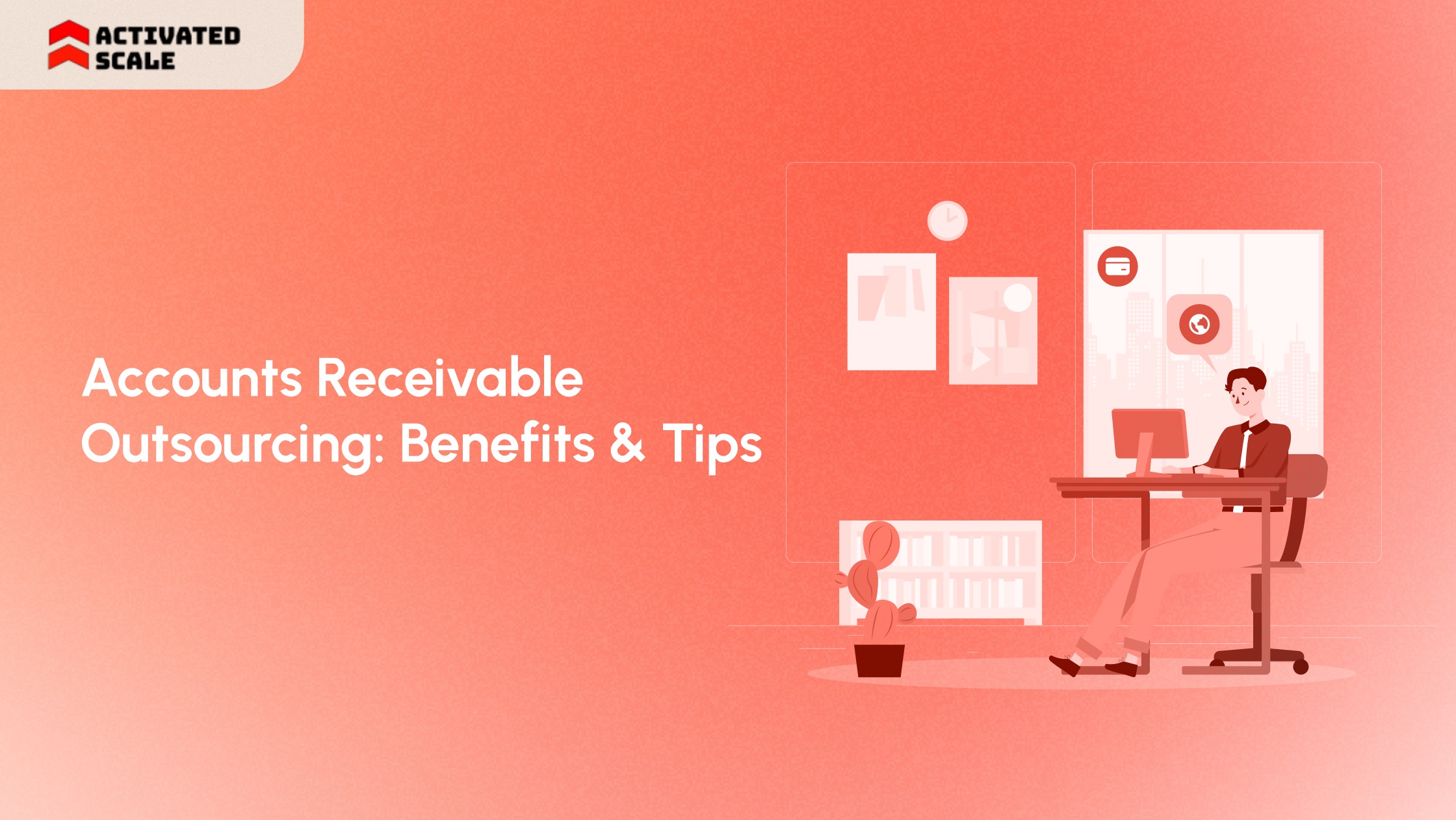Hiring strong sales talent remains a major challenge for many businesses today, whether it’s finding representatives who can consistently close deals or those who stick around long enough to make an impact.
Inside sales representatives carry a heavy load, often making numerous cold calls daily just to find qualified prospects. This relentless pace underscores the importance of having a clear, efficient sales process that makes every interaction count. Sales process consulting helps refine these workflows to support sales teams under pressure by reducing bottlenecks and setting clear roles.
In this guide, the focus will be on defining sales process consulting, exploring its benefits, and providing expert steps to build a sales process that allows measurable, sustainable growth.
Key Takeaways
- Standardization Unlocks Predictable Sales: Consulting builds structured workflows and clear stages, ensuring consistency, smoother handoffs, and more reliable forecasting across sales teams.
- Bottlenecks Become Measurable and Fixable: Deal-tracking diagnostics and velocity metrics flag stalls early, allowing proactive interventions that keep pipelines moving and shorten sales cycles.
- Buyer-Centric Stages Drive Pipeline Momentum: Aligning sales stages with buyer behavior reduces friction, clarifies progression signals, and sustains steady deal momentum through the pipeline.
- Fractional Talent Speeds Implementation: Activated Scale’s fractional SDRs and AEs onboard quickly, align with deal sizes, and accelerate measurable sales growth without heavy hiring costs.
What is Sales Process Consulting?
Sales process consulting is a specialized service for businesses seeking to refine and standardize how sales teams operate, with an emphasis on increasing sales, increasing revenue predictability, and reducing bottlenecks throughout the sales pipeline.
Sales process consulting encompasses rigorous analysis, design, and ongoing improvement of sales workflows to result in more consistent outcomes and scalable revenue.
What Sales Process Consultants Do?
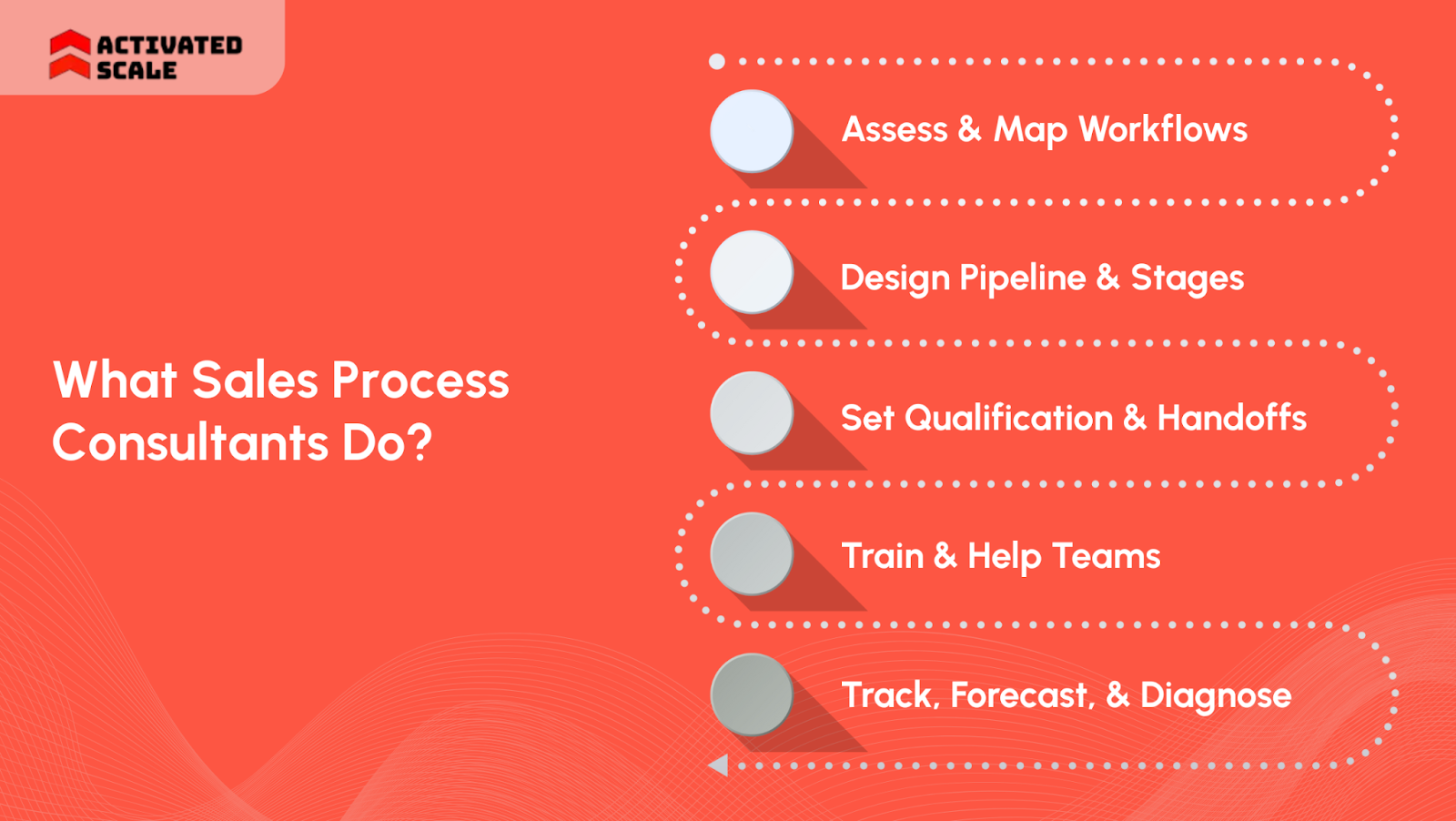
Here’s what sales process consultants typically do to help with that.
- Assess and Map Workflows: Sales improvement consultants review how your team currently operates, identify stages where deals stall, and map the buyer journey to clarify progression signals.
- Design Pipeline and Stages: They create clear sales funnel stages with benchmarks and accountability, ensuring representatives know when deals advance and managers can spot problem areas easily.
- Set Qualification and Handoffs: Consultants develop consistent qualification rules and structured handoff procedures, reducing confusion, speeding transitions, and keeping opportunities moving smoothly.
- Train and Help Teams: Through interactive workshops, they teach process methods, answer real-world questions, and provide adoption across various sales experience levels.
- Track, Forecast, and Diagnose: They implement monitoring systems, forecasting frameworks, and deal diagnostics to flag stuck opportunities, improve predictability, and maintain an active, healthy pipeline.
After understanding what sales process consultants actually do for a team, the next step is seeing how to put those ideas into practice with a clear, step-by-step guide.
Building a strong pipeline starts with getting the basics right, learn more in this Essential Components and Process of Sales Development.
Step-by-Step Guide to Building a Winning Sales Process
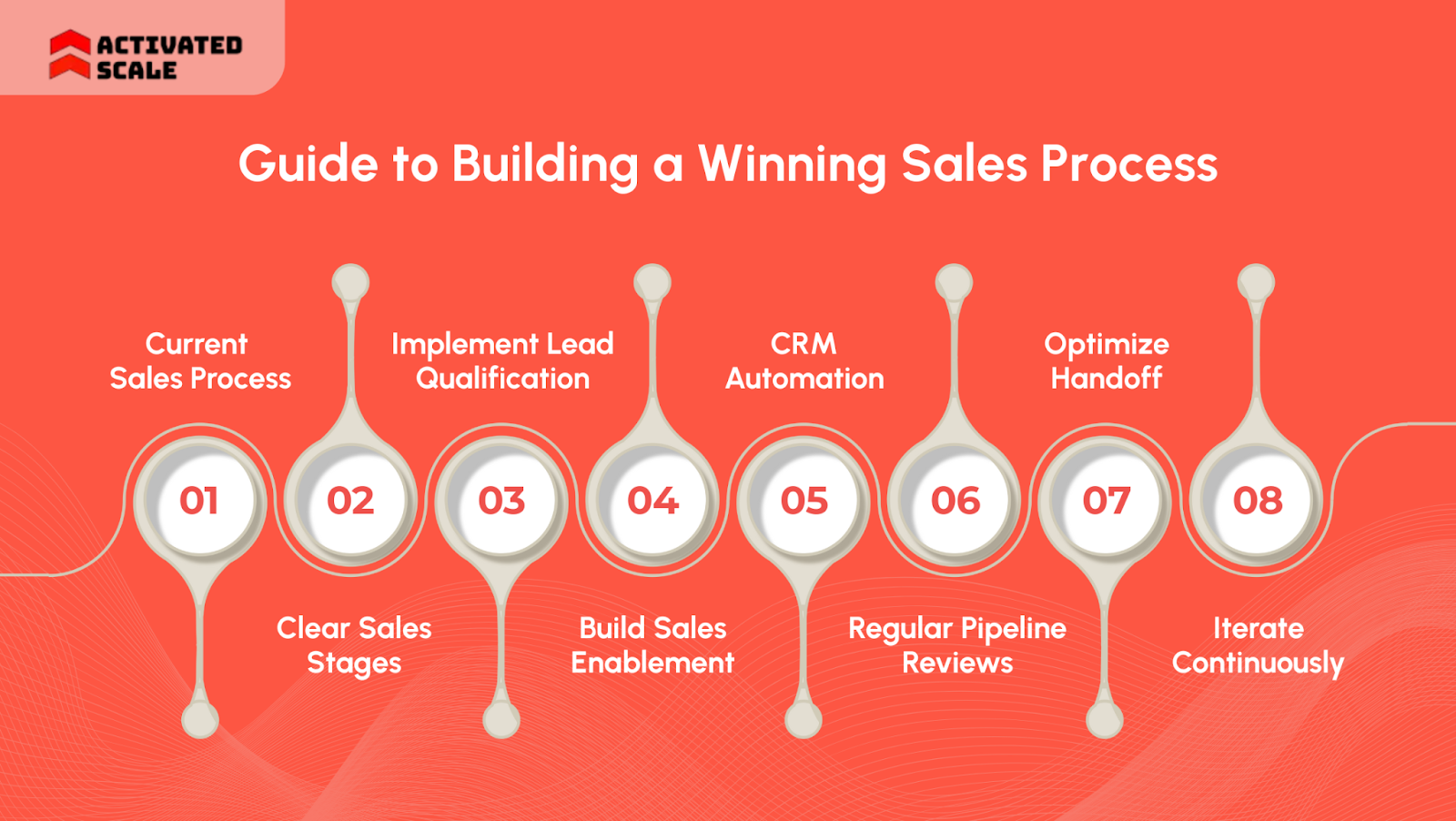
Building a clear sales process means taking a close look at how things currently run and making practical adjustments that help deals move steadily forward. It’s about creating straightforward steps that everyone on the team understands and follows, cutting down confusion and delays.
Here’s a step-by-step approach to set that up with sales process consulting.
Step 1: Map Your Current Sales Process
Visualizing your existing sales workflow helps identify gaps and inefficiencies before optimization begins.
Key tips:
- Audit existing stages: Document every interaction from initial contact to contract signing, noting where leads typically stall.
- Gather stakeholder input: Interview sales reps, managers, and customers to capture different perspectives on process strengths and weaknesses.
- Identify data gaps: Review CRM usage patterns and data quality issues that prevent accurate pipeline tracking.
Step 2: Define Clear Sales Stages and Exit Criteria
Structured stage progression creates consistency across your sales team while improving sales forecasting accuracy.
Key tips:
- Set progression requirements: Establish specific criteria prospects must meet before advancing to the next stage.
- Align with buyer journey: Structure stages to mirror how customers actually make purchasing decisions, not internal preferences.
- Create accountability checkpoints: Define required activities and deliverables for each stage to maintain process discipline.
Step 3: Implement Lead Qualification Framework
Effective sales process consulting starts with consistent lead evaluation to focus efforts on winnable opportunities.
Key tips:
- Choose an appropriate framework: BANT is fast and simple, ideal for quick qualification in transactional sales. MEDDIC is detailed and relationship-focused, best for complex, multi-stakeholder enterprise deals.
- Train team consistently: Standardize qualification questions and criteria across all representatives to prevent pipeline inconsistencies.
- Score prospects systematically: Create numerical scoring systems based on qualification criteria to prioritize follow-up activities.
Step 4: Build Sales Enablement Resources
Equipping your team with process-specific assets accelerates deal progression and improves win rates.
Key tips:
- Create stage-specific content: Develop playbooks, email templates, and objection-handling scripts for each sales stage.
- Develop discovery question banks: Prepare consultative questions that uncover pain points and business impact.
- Design proposal templates: Standardize proposal formats that clearly connect solutions to customer challenges.
Step 5: Set Up CRM Automation and Tracking
Technology infrastructure supports process consistency while providing visibility into pipeline health.
Key tips:
- Configure workflow automation: Set up automatic task creation, follow-up reminders, and stage progression alerts.
- Design performance dashboards: Create real-time visibility into conversion rates, stage velocity, and individual representative performance.
- Implement data validation: Establish required fields and data quality rules to maintain accurate pipeline reporting.
Step 6: Establish Regular Pipeline Reviews
Consistent pipeline management identifies stalled deals early while providing coaching opportunities.
Key tips:
- Schedule weekly deal reviews: Focus on stage progression, next steps, and potential obstacles rather than just pipeline value.
- Conduct deal inspections: Ask specific questions about buyer engagement, competition, and timeline accuracy.
- Track velocity metrics: Monitor time-in-stage data to identify bottlenecks and coaching opportunities.
Step 7: Optimize Handoff Processes
Smooth transitions between team members prevent pipeline leakage and maintain buyer momentum.
Key tips:
- Create handoff checklists: Document all required information and context needed for successful transitions.
- Set response time standards: Establish SLAs for lead follow-up and internal communication between team members.
- Design shared visibility tools: Implement dashboards that give all stakeholders real-time access to deal status and history.
Step 8: Measure and Iterate Continuously
Data-driven process refinement ensures your sales system adjusts to changing market conditions and buyer behavior.
Key tips:
- Track leading indicators: Monitor activity metrics like calls made, emails sent, and meetings scheduled alongside outcome metrics.
- Analyze win-loss patterns: Review closed deals quarterly to identify successful strategies and common failure points.
- Test process improvements: Implement A/B tests for messaging, timing, and approach variations to optimize performance.
How Sales Process Consulting Makes Selling Simple
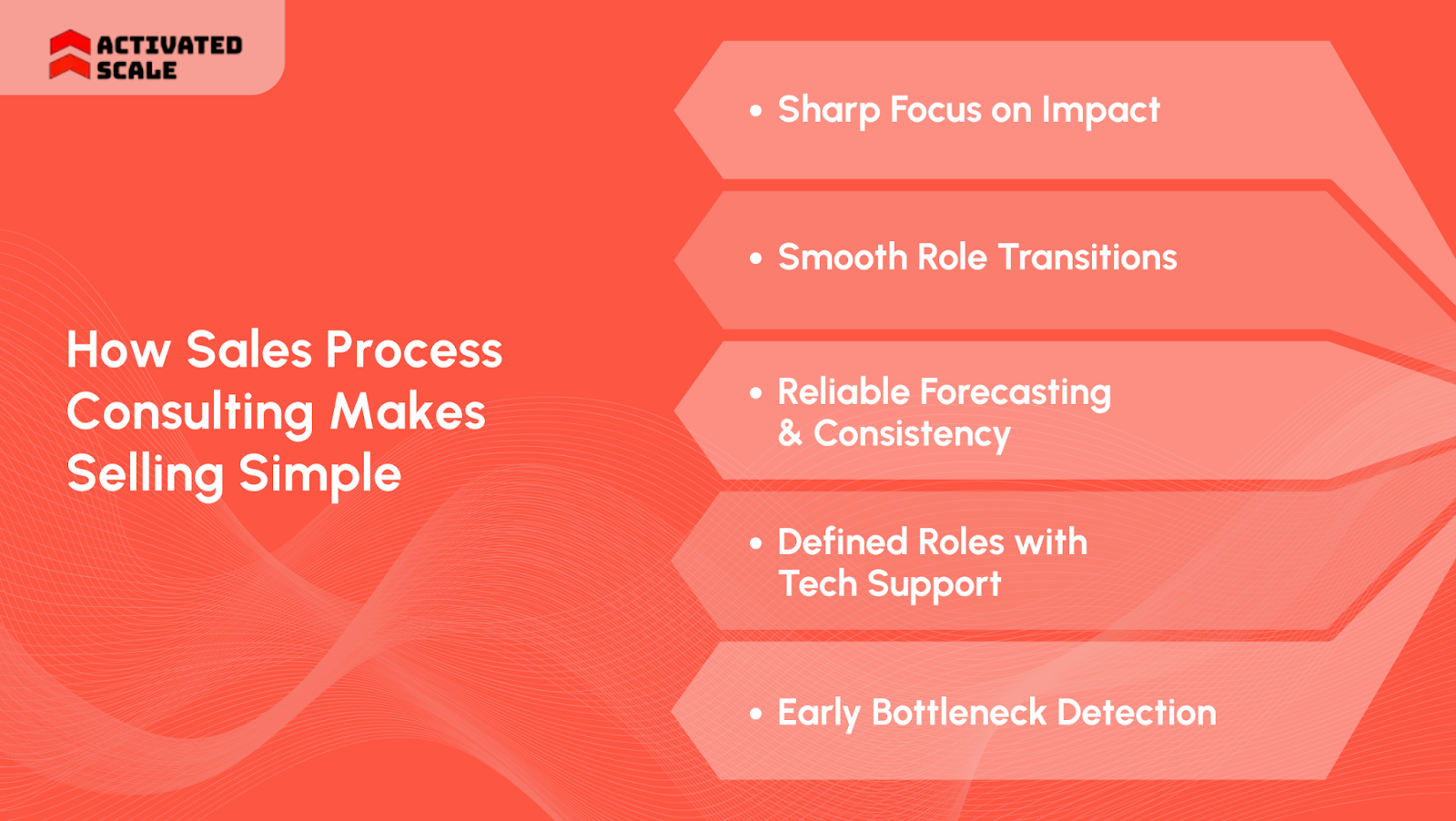
Sales process consulting clears away the clutter, helping teams focus on what really moves deals forward. It connects the dots so every step and role fits together without confusion or wasted effort. Here’s how it makes selling simpler and more dependable.
- Sharp Focus on Impact: Consulting highlights the activities that truly drive deal closures, keeping representatives and managers focused on high-value, result-generating tasks.
- Smooth Role Transitions: Clear handoff rules reduce delays and confusion, ensuring prospects move smoothly through different sales roles without losing momentum.
- Reliable Forecasting and Consistency: Measurable benchmarks and sales tracking increase forecast accuracy, while standardized processes reduce outcome variability for steady, predictable sales results.
- Defined Roles with Tech Support: Role clarity strengthens accountability and coaching, while recommended tools automate admin tasks, improving visibility and freeing representatives to sell more effectively.
- Early Bottleneck Detection: Transparent deal-tracking methods flag stalled opportunities quickly, enabling proactive problem-solving and faster movement through the sales pipeline.
Finding the Sales Process Consultant Who Fits Your Team
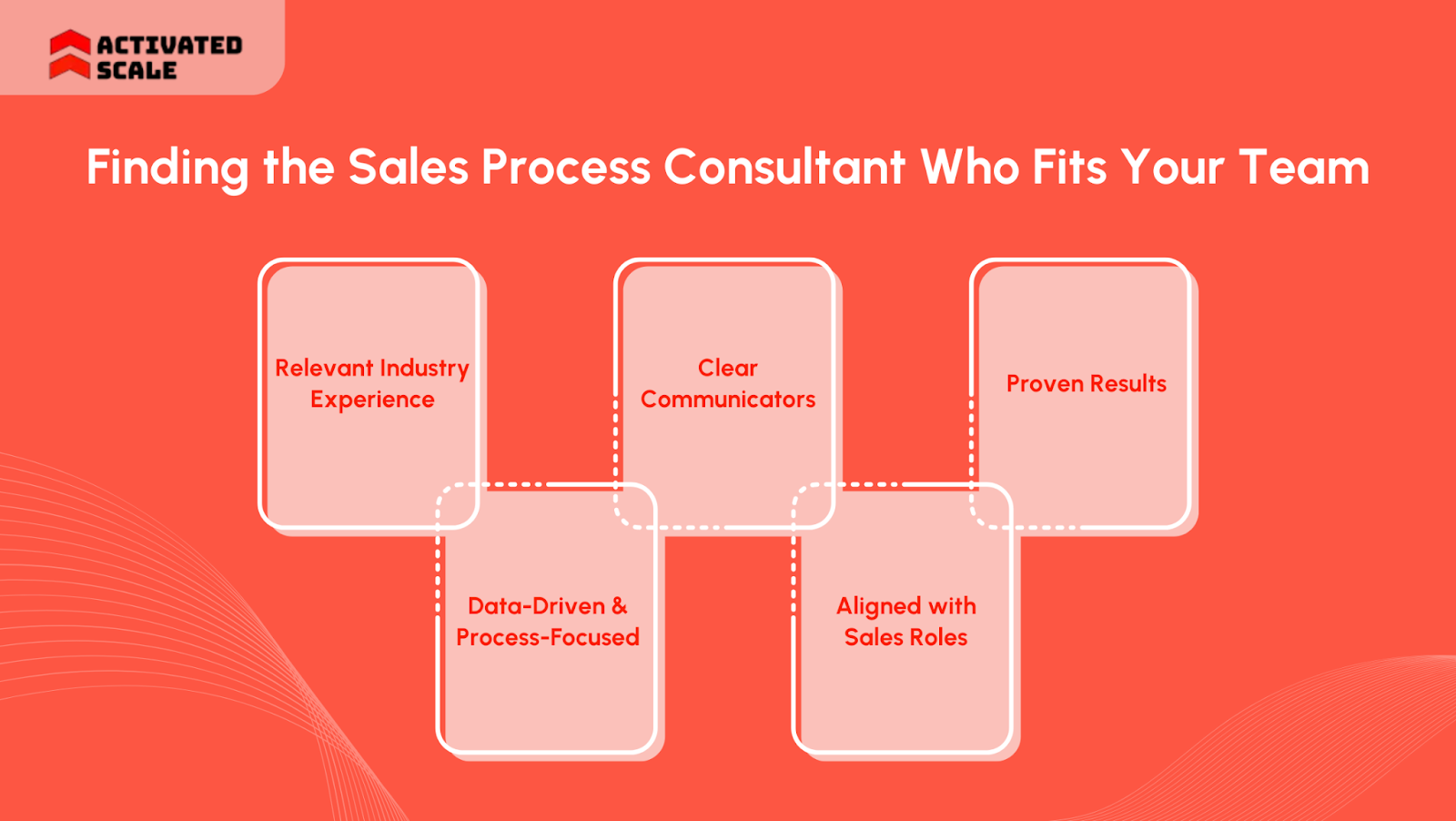
Finding the right sales process consultant is more than just ticking boxes—it’s about working with someone who truly gets how your team operates and the challenges you face. The fit matters because that understanding shapes how useful their advice will be day to day.
Here are key qualities to look for when choosing a consultant for sales process consulting.
- Relevant Industry Experience: Choose consultants with proven expertise in your industry or similar businesses, ensuring practical insights and context-specific recommendations.
- Data-Driven and Process-Focused: The best consultants rely on performance metrics, pipeline analysis, and targeted questions to identify inefficiencies and design workflows customized to your team’s goals.
- Clear Communicators and Trainers: They provide straightforward action plans, explain recommendations simply, and run hands-on workshops that build real-world skills, not just theoretical knowledge.
- Aligned with Sales Roles: Effective consultants understand SDR, AE, and leadership challenges, including fractional team setups, and design solutions that match role expectations.
- Proven Results: Look for case studies or testimonials that show measurable impact, such as faster sales cycles, higher conversion rates, or improved forecasting accuracy.
Sales Process vs Pipeline vs Funnel: What Consultants Bring
Getting the most out of sales process consulting involves knowing what tools to use at each stage of your sales efforts. Not every approach fits all teams, so understanding how a consultant can help refine your workflows, track deals, and visualize customer journeys keeps things on track.
Here’s a clear look at how sales process consulting distinguishes itself through what it offers for your organization.
Powering Efficient Sales Process Consulting with Activated Scale
Activated Scale simplifies sales process consulting by linking startups with proven, experienced fractional sales talent who understand buyer profiles and deal sizes. This approach removes hiring guesswork, allowing quick scalability in sales resources without long delays or high costs.
- Proven Talent Alignment: Activated Scale provides sales professionals experienced with relevant buyers and deal sizes, ensuring immediate alignment with consulting goals.
- Flexible and Quick Hiring: With fractional SDRs and AEs, roles can scale up or down. Positions are filled in 5–7 days, faster than traditional hiring.
- Cost-Efficient Engagements: Transparent pricing eliminates payroll and benefit costs, lowering onboarding expenses and making consulting-driven sales improvements more affordable.
- Fast, Supported Onboarding: New hires become productive in about two weeks, supported by personal advisors who guide them on tools, metrics, and sales coaching.
- Growth with Flexibility: Consulting strategies gain momentum through measurable outcomes, booked meetings, demos, and revenue growth, backed by risk-free terminations for adaptability.
In Conclusion
Sales process consulting delivers practical frameworks to refine sales workflows, helping teams reduce inefficiencies and improve consistency for better revenue outcomes. Misaligned roles, unclear stages, and data gaps can quietly stall deals if left unaddressed. Recognizing these issues early in your sales process is essential to building a repeatable, scalable system.
Activated Scale simplifies sales growth by connecting startups with vetted US-based sales talent who fit your market and sales cycle. Their flexible approach lets you scale your sales team quickly without long hiring delays or high overhead. Transparent pricing, immediate onboarding, and personalized support take much of the guesswork out of expanding sales capacity.
Book a consultation today to discover how they can support your sales process consulting goals and accelerate growth.
FAQs About Sales Process Consulting
1. What role does sales process consulting play in fractional sales teams?
Sales process consulting helps fractional SDRs, AEs, and sales leaders standardize workflows and responsibilities, creating predictable results despite part-time or remote roles.
2. How does sales process consulting address bottlenecks unique to new product launches?
Sales improvement consultants analyze early sales data and tweak process stages to clarify qualification and handoff steps, reducing stalled deals during initial market entry.
3. Can sales process consulting improve lead qualification without adding tools?
Yes, by refining qualification criteria and representative actions, consulting can improve lead filtering and prioritization using existing systems and data better.
4. What challenges arise in aligning marketing and sales through sales process consulting?
Misaligned goals and poor communication create friction; sales improvement consultants facilitate shared metrics and stage definitions to promote collaboration between teams.
5. How does sales process consulting adapt when sales tech platforms change?
Sales improvement consultants reassess workflows and retrain teams to fit new tools, ensuring process steps remain consistent while leveraging platform capabilities.
The Ultimate Guide to Hiring a Salesperson!
Get the step-by-step guide to hiring, onboarding, and ensuring success!
_edi.png)
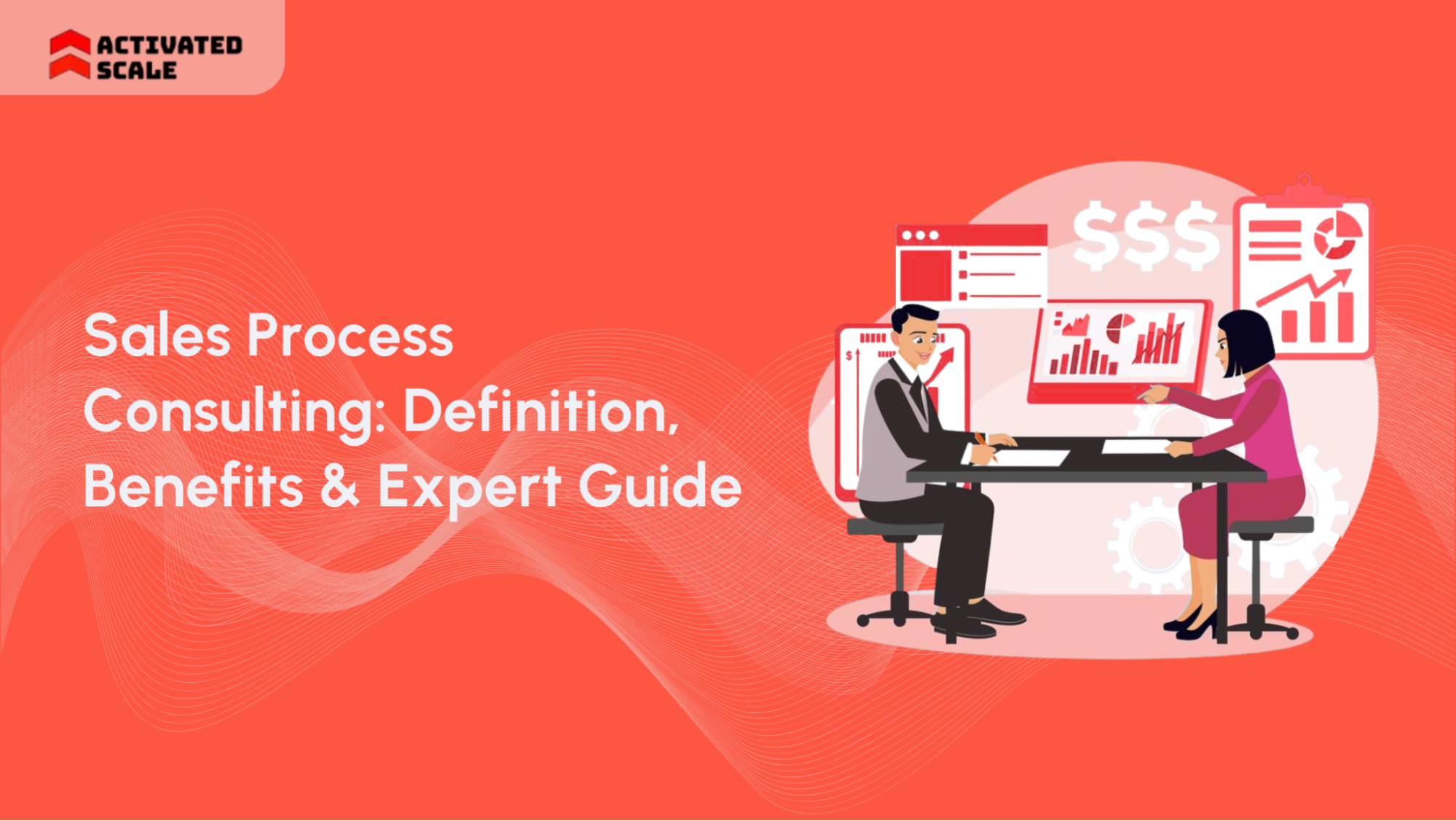
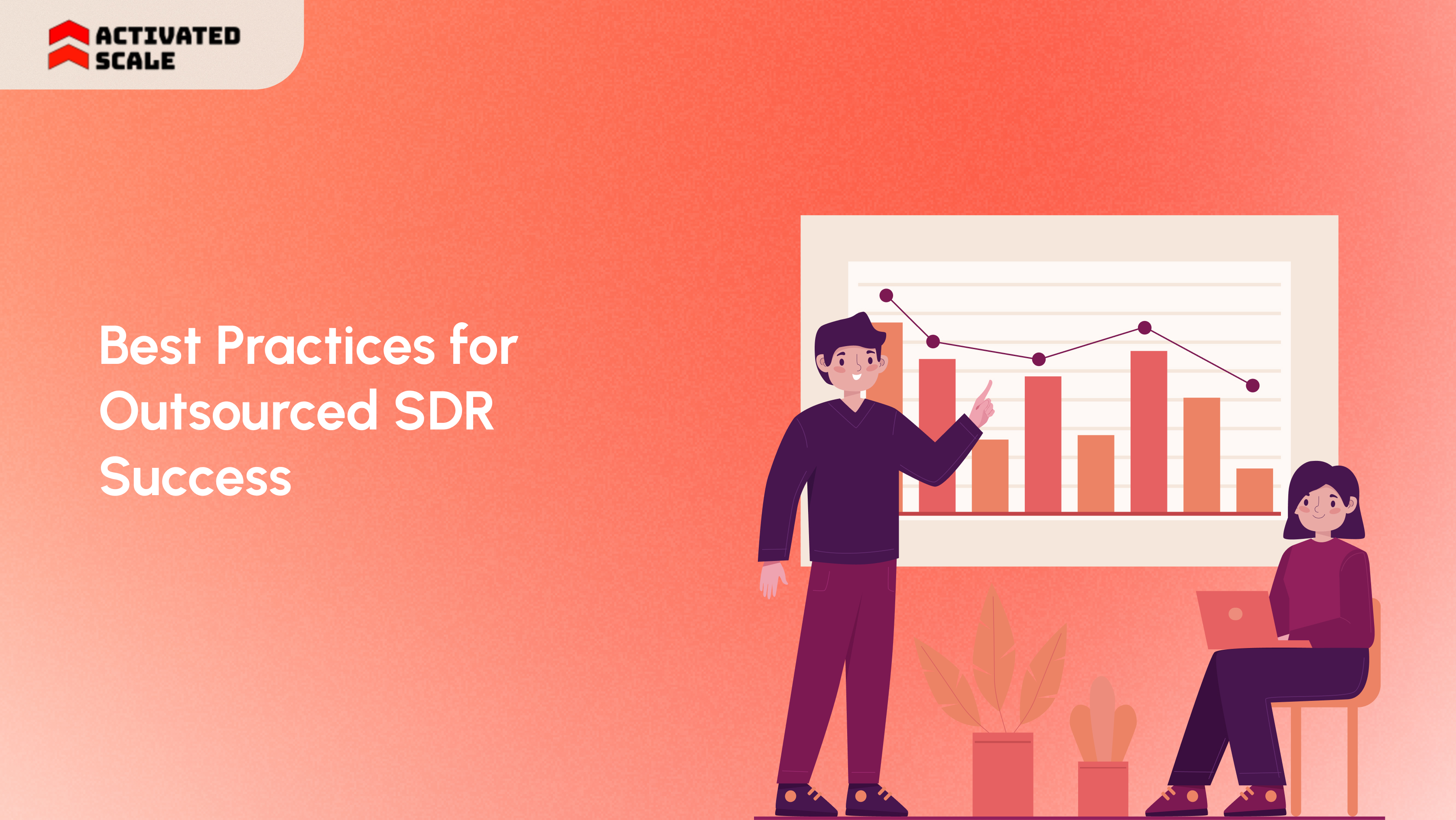
.jpg)
